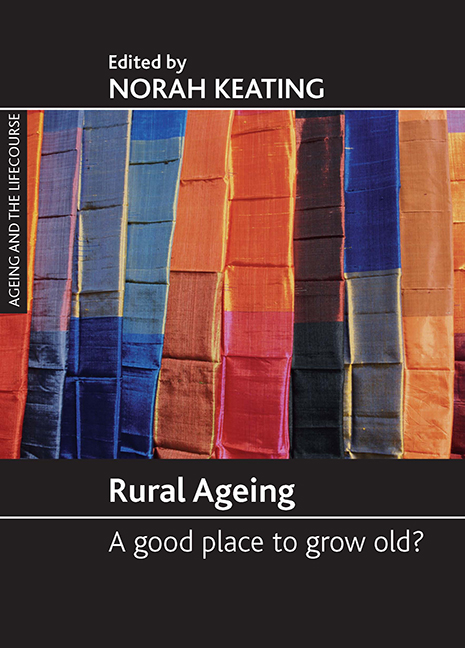Book contents
- Frontmatter
- Contents
- Foreword
- Acknowledgements
- Notes on contributors
- one A critical human ecology perspective on rural ageing
- two Crossing borders: lifecourse, rural ageing and disability
- three Rurality and ageing well: ‘a long time here’
- four The evolution of networks of rural older adults
- five Distance, privacy and independence: rural homecare
- six Respite for rural and remote caregivers
- seven Ageing, disability and participation
- eight Participation in rural contexts: community matters
- nine Staying connected: issues of mobility of older rural adults
- ten Ageing and social exclusion in rural communities
- eleven Age-friendly rural communities
- twelve Revisiting rural ageing
- References
- Index
- Other titles in the Ageing and the Lifecourse series
ten - Ageing and social exclusion in rural communities
Published online by Cambridge University Press: 19 January 2022
- Frontmatter
- Contents
- Foreword
- Acknowledgements
- Notes on contributors
- one A critical human ecology perspective on rural ageing
- two Crossing borders: lifecourse, rural ageing and disability
- three Rurality and ageing well: ‘a long time here’
- four The evolution of networks of rural older adults
- five Distance, privacy and independence: rural homecare
- six Respite for rural and remote caregivers
- seven Ageing, disability and participation
- eight Participation in rural contexts: community matters
- nine Staying connected: issues of mobility of older rural adults
- ten Ageing and social exclusion in rural communities
- eleven Age-friendly rural communities
- twelve Revisiting rural ageing
- References
- Index
- Other titles in the Ageing and the Lifecourse series
Summary
Introduction
In this chapter, we adopt the concept of social exclusion as a means to explore issues around disadvantage faced by older people in rural communities. The focus on social exclusion is important in casting light on the varied, and often hidden, nature of disadvantage experienced by older rural residents in many Western societies. Such disadvantage potentially challenges views about the degree to which rural communities represent good places in which to grow old. Our approach is underpinned by a critical gerontology perspective. With its focus on the structural causes of inequalities in later life, its appreciation of the cumulative impacts of disadvantages faced by different groups of older people and its value-based commitment to bringing the voices of older people to the fore (Bernard and Phillips, 2000; Holstein and Minkler, 2007), the critical perspective lends itself especially well to the analysis of social exclusion among older people in rural settings. Drawing on findings from a qualitative study, we examine individuals’ accounts of exclusion, explore lifecourse influences on exclusion and assess the impacts of exclusion on quality of life. The chapter concludes by highlighting the distinctive features of rural older people's social exclusion, and suggesting some ways in which rural policy might serve to reduce such exclusion.
Rural perspectives on social exclusion and ageing
Current research and policy debates in Western societies around social exclusion provide an ideal framework for exploring the situation of rural older people. While such debates primarily focus on the situation of children, young people and families, a growing body of research explores ways in which older people experience forms of exclusion (Scharf et al, 2005b; Patsios, 2006). Defined as ‘the dynamic process of being shut out, fully or partially, from any of the social, economic, political and cultural systems which determine the social integration of a person in society’ (Walker and Walker, 1997,p 8), the multidimensional nature of exclusion is reflected in attempts to operationalise the concept in empirical studies (Burchardt et al, 2002; Pantazis et al, 2006). While there are significant overlaps between the concepts of social exclusion and poverty, with Bauman (1998, p 37) arguing that ‘poverty means being excluded from whatever passes for a “normal life”’, exclusion discourse extends the traditionally more limited view of poverty as representing the lack of material resources.
- Type
- Chapter
- Information
- Rural AgeingA Good Place to Grow Old?, pp. 97 - 108Publisher: Bristol University PressPrint publication year: 2008



